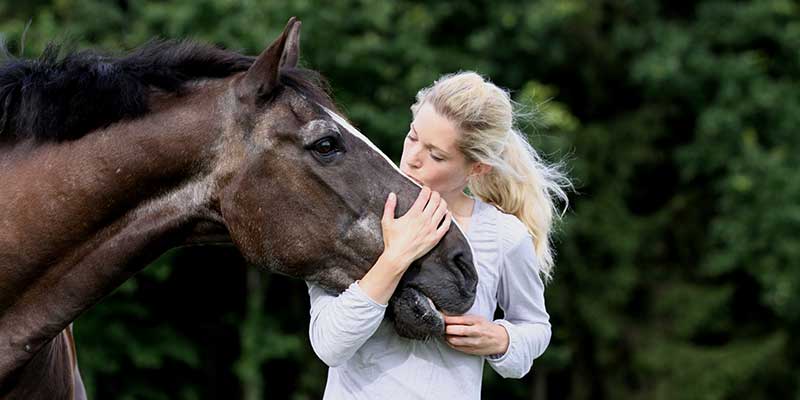Horse Health
How to Care for your Senior Horse – Top 6 Things You Need to Know About Senior Horse Health
Keeping your senior horse in the best shape requires specialized care at every stage of their life. When caring for an older horse, a good balance of regular exercise, strategic nutrition, and weight management are extremely important. Senior horse health involves everything from hoof care to joint support to regular farrier visits to dental exams.
These top senior horse health tips can help you ensure you’re providing your older horse with an optimum quality of life.
1. Monitor Vitals
To keep your senior horse healthy as they age, it’s essential to monitor your horse’s health and consult your vet frequently. Both you and your veterinarian should routinely document your horse’s temperature, pulse, and respiration (TPR) rate – there’s handy information on finding those vital signs available in our guide to taking and understanding TPR measurements.
2. Stay Up to Date on Vaccinations
In addition to closely monitoring vitals, a visit from your vet is a great opportunity to talk about vaccinations and which ones they recommend for your aging horse. Similar to aging humans, older horses are often more likely to have lower immune systems. Your vet may recommend giving vaccines to protect for example, against West Nile. These vaccines may be done separately or more frequently throughout the year to ensure a stronger immune response.
3. Maintain a Healthy Weight
It’s especially important to keep track of your older horse’s weight, as both weight loss and weight gain could be signs of larger issues. As horses age, it can become harder and harder for them to digest protein and fiber. Unhealthy weight loss can be caused by parasites, illness, or dental issues and can often be resolved with a the right horse supplements, changed diet and appropriate medication.
Older horses that are overweight may experience issues with their hooves, joints, and muscles due to the added stress. Giving your senior horses regular exercise will help maintain a healthy weight and increase intestinal motility, which will help prevent spasmodic colic.
Naturally, the best way to keep your older horse healthy is to have a veterinarian visit on a consistent schedule. While annual check-ups work well for most senior horses, you should check with your vet in case your horse might need additional attention. Your vet may request to check up on your horse more as they age, as senior horses are more prone to health issues and cancer than their younger counterparts.
Remember to speak with your veterinarian about your older horse’s gut health and exercise levels if you notice any unusual fluctuations in their weight.
4. Stay on Top of Dental Care
Another potential reason for weight loss or other hazardous health effects is poor dental care. Your senior horse’s teeth will continue to wear down as they age and may develop sharp points or even cavities. In extreme cases, your horse could even lose their teeth or develop ulcerations in their mouth. Scheduling dental exams for your senior horse every six months should help you keep on top of their oral hygiene.
For older horses, feeding time cannot be rushed– since they can’t chew as quickly as their younger equine friends, your senior horse may need some extra chow time. They might also benefit from eating separately from the other horses, having multiple sources of food, and eating smaller meals multiple times a day.
If your horse is struggling to chew due to old, worn-down chompers, there is wet food available that would be much easier on achy teeth. You can also try different forms of their favorite food, like chopped hay, pellets, or rolled grain.
You should also look out for signs of dental issues, including choking, difficulty chewing, consistently dropping food, or leaving manure with long grain fibers. Tell your vet right away if you think your horse could be suffering from oral discomfort.
5. Keep Up with Bone and Joint Health
As your horse ages or performs in challenging disciplines it’s very important to keep a close watch on their joint and bone health. It is a good idea, for either of those reasons, to use a quality joint supplement as a way to support ongoing healthy joint function. A good joint supplement will help keep the joint well-lubricated and boost shock absorption.
6. Don’t Overlook Hoof Maintenance
Even though your older horse may not be as active, it’s still important to make sure their hooves are trimmed regularly. Keeping your horse on a consistent schedule with a trusted farrier can go a long way in making sure their hooves stay in top-notch condition.
If you notice that your senior horse is having foot issues, like chipping or cracking, it could mean that their hoof walls are weakening due to age – talk to your farrier about how hoof supplements can help. In addition to consulting with your farrier, you can also ask your veterinarian about a horse feed supplement to keep their hooves healthy and their feet happy.
Prioritize Health Care for Your Senior Horse
There can be a lot to keep track of when dealing with senior horse health. Whether it’s monitoring their body weight or checking their teeth, maintaining your older horse’s physical condition can be a challenge.
Double-check that your senior horse has been scheduled for their regular medical appointments, and don’t be afraid to call the vet if you have any questions or concerns. Luckily, with a reliable veterinarian, experienced farrier, and you, your horse can have a medical dream team ready to help them thrive through their later years.
Keeping an eye out for potential issues– and working closely with your vet to monitor your equine companion– is the key to resolving health issues as early as possible.
And remember, the Grand Meadows team is here to help you care for your senior horse. Contact us with any questions or concerns you have about your senior horse.

